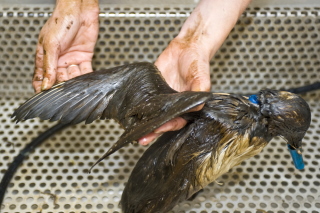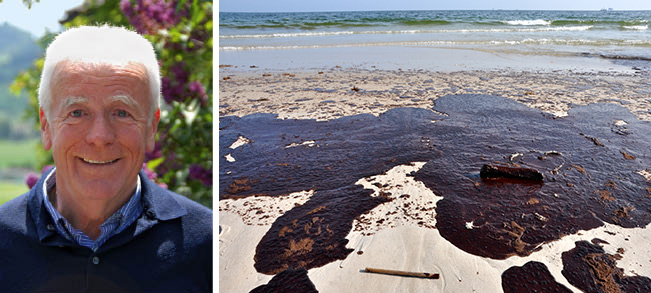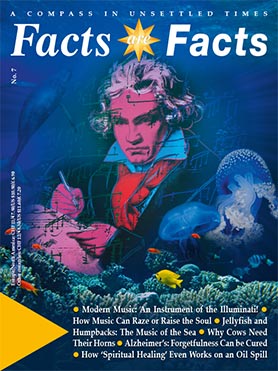Anton Styger: Healing the Sea from an Oil Spill
With the massive oil disaster off the Gulf of Mexico currently causing outrage, clairvoyant Anton Styger relates how in 2003 he helped to restore the battered northern coast of Spain to health—by spiritual means alone!

A cruel, sticky death: the oil leaking off La Coruña caused an ecological disaster whose consequences were miraculously less severe than had been feared—but what have we learned from it?
It came as no surprise to Anton Styger1 when in November 2002 the Prestige oil tanker sank off the north-west coast of Spain and polluted the whole coastline with its week-long oil spill. Styger, who had experienced two detailed visions of 9/11, had been warned four weeks previously that an oil tanker would go down off the coast of northern Spain, and that a second ship would do the same near Gibraltar shortly thereafter, followed by a third in the English Channel—but which would not have the same devastating environmental impact as the Prestige.
The “Spirit of the Seas” told Styger that it would serve as a warning and lesson to the people who made their living from the sea. The animals would be warned; the fish and aquatic creatures would leave the area before it happened. None would die, but the seabirds would probably not leave the region. Many of them would even die willingly so that man would be able to see and learn from the destruction happening before his eyes.
Anton Styger writes about this in his second book Experiences with the Intermediate Worlds—Salvations (available only in German):
“For many, it wasn’t particularly important—northern Spain is far away, nobody goes there on holiday anyway… But we in the [Swiss] canton of Zug had a special kind of awareness. Left-wing politicians and many others that held Nature dear to their hearts were taking to the streets and demonstrating. The oil merchants are based in Zug. [So too is the company that owned the oil platform Deepwater Horizon, which sank in the Gulf of Mexico in late April 2010, Ed.].
It was a Russian company whose ailing tanker had begun to leak. We realised that such companies—which, however, pay a lot of taxes in Switzerland (yet still only about half of the taxes they pay at home!)—are in real danger of harming Switzerland’s reputation. This company only employed the cheapest ship-owners for transport. No one asked about safety or maintenance obligations, but this trading company audaciously announced that their crude oil was ‘of course’ insured. Yet at that time nobody realised what havoc this would wreak on Nature and on Spain, the country most affected by the spill. Throughout that whole winter, I followed the course of this oil disaster. Oil flowed incessantly from the tanker, which rested three thousand metres down at the bottom of the sea. They couldn’t draw off the oil thanks to the brutal weather and billowing waves. Huge amounts of the stuff pushed towards the coast. As the new year arrived, it was reported that about two thousand kilometres of barely accessible rocky coast were already polluted. Marine biologists and fishing authorities said it was the biggest contamination of the sea there had ever been, and estimated that no fishing would be possible for between thirteen and fifteen years. The feeling of rage and helplessness in all Spain, but particularly the affected north-west, was immense. Legions of helpers were on site for months cleaning the beaches and coast, but it was truly a Sisyphean task: barely would they finish at one place before the next pool of oil would come flooding in overnight, polluting everything all over again. The easiest thing to do was to use machines, but the north-west regions of Galicia, Asturias and the Basque Country consist largely of steep rocky coastline and stony beaches. The Atlantic itself made the job (which needed to be done mainly by hand) even harder with its incessant two-metre waves and mighty tides.
By late autumn I had attempted to organise a group of volunteers. I put a few adverts in the paper with a donations account and the plea to help northern Spain. Demoralizingly, not even ten centimes had gone into the donations account: the call ‘sanemos la playa’ didn’t seem to interest anyone.
In January 2003, I was unable to sleep for a whole week. I constantly sensed the Spirit of the Seas around me, so in the end I simply decided to go there myself. The next morning I told my wife of my intentions, and she helped me shift all my work appointments at short notice. I bottled up some fresh spring water with which to ‘vaccinate’ the coastal sections when I was there. Together with dear friends from two meditation groups—one in Zürich, the other in St. Galler Rheintal—I arranged daily prayer appointments to be held from 5:45 pm to 6 pm. We wanted to envelop the whole coastal stretch from the point I would start each morning to the point I would finish each evening with healing light; with the most heartfelt ‘everything is safe and whole’ visualisation. Only a very small number of people were doing this white magic with me, but they were full of love and therefore very efficient.”

In visions in 2002, Anton Styger saw the impending tanker accident of the ruptured ‘Prestige’, which contaminated the entire northwest coast of Spain.
His journey wasn’t exactly easy to arrange; it wasn’t the right season to go to northern Spain. Yet as is always the way, if you are on a ‘higher mission’ there will always be invisible helpers to aid you with just what you need. In some places it was difficult for Anton Styger to reach the coast at all, because lots of paths had been closed by the military. He knew immediately that there was still plenty of the oil sludge they didn’t want anyone to see. The stench of petroleum-bitumen, which could be smelled two kilometres out from the coast, testified to this, too.
“There were only a few places where I could get directly to the water. The sight was enough to make you cry; everything was contaminated with oil. The entire Atlantic coast of Spain consists of steep rock faces with some mighty boulders. Countless tiny islands or ledges tower up from the sea. It had been a paradisiacal idyll before this black oil death came. The worst affected by this oil carpet was the coastline west of the industrial city of La Coruña, from the bay right up to the iron-manufacturing town of Ferrol. Countless volunteers were slogging away there for weeks. You couldn’t stand the stink; it made you sick and to top it all off, it was toxic, too. Most cliff walls are only accessible from the sea and then only at low tide. The many volunteers equipped with scrapers and buckets trying to free the cliffs from the oily film and viscous, black slick seemed to me like ants in a gravel pit—all helplessly overwhelmed. And as already mentioned, in all likelihood everything would get dirty again overnight and the hard work of the last few days would be completely in vain.
I talked to the heads of operations for German and French volunteer groups. Both believed that it would be several decades before the two thousand or so kilometres of rocky coastline were even somewhat cleaned. Not exactly an encouraging thought for those dear helpers.
Every TV channel in Spain broadcast nightly reports about the current status of the disaster. The atmosphere was anything but good and I was happy that I wasn’t travelling in a car displaying Swiss emblems. At the time I was there, the biggest demonstrations were taking place in Madrid: more than 750,000 people took to the streets—an unprecedented event in this country. Blood was boiling in the hearts of all Spaniards.
Wherever I was able to reach the sea, I did a healing meditation and marked the points with healing spring water. Of course, I also meditated at the arranged hour with the meditation groups. We visualised the coastal areas as perfectly clean, safe and alive. By the very next morning, I saw how our healing light was draped over the shores in bright strips like an illuminating aura.”
Sources
- 1 Read the comprehensive article about Anton Styger and his spiritual work: Anton Styger: The Man Who Drives the Dragon From the Door






